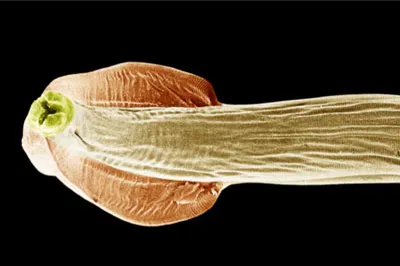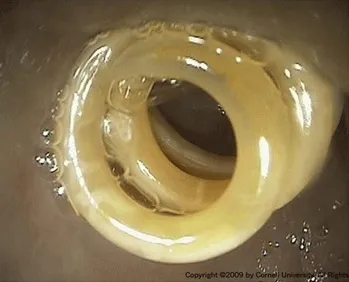Roundworms are one of the most widespread internal parasites affecting dogs, with nearly all puppies encountering them at some point in their lives. These common parasitic worms are not just a concern for canine health; they also pose a significant, albeit often overlooked, risk to humans. Understanding how humans get roundworms from dogs is crucial for every pet owner, enabling proactive steps to protect both their furry companions and their family’s well-being.
Understanding Roundworms in Dogs
Roundworms, specifically Toxocara canis, are spaghetti-like worms that reside in a dog’s intestines. Their lifecycle is complex, allowing for several routes of infection in dogs, making them highly prevalent and challenging to eradicate entirely from environments. Puppies are particularly vulnerable, often acquiring the parasites directly from their mother.
A mother dog can pass roundworm larvae to her puppies while they are still in her uterus, meaning puppies can be born already infected. After birth, puppies can become infected by ingesting larvated eggs from contaminated environments or by consuming worm larvae through their mother’s milk. Additionally, dogs can contract roundworms by eating small mammals like mice that harbor roundworm larvae in their tissues. This ease of transmission underscores the importance of consistent parasite control measures.
 Dog roundworm magnified view
Dog roundworm magnified view
Many adult dogs might not show obvious signs of roundworm infection. However, puppies and dogs with heavy worm burdens can exhibit symptoms such as diarrhea, vomiting, unexplained weight loss, a dull coat, and a characteristic pot-bellied appearance. If the roundworms migrate to the lungs, a cough may develop. Occasionally, pet owners might observe adult roundworms in their dog’s feces or vomit; these worms are typically white or light brown and can be several inches long. For those concerned about comprehensive parasite management, understanding solutions like all in one flea and wormer for dogs can be highly beneficial.
The Risk to Humans: How Do Humans Get Roundworms from Dogs?
The primary way humans get roundworms from dogs is through the accidental ingestion of microscopic roundworm eggs. These eggs are passed in the feces of infected dogs and become infective after maturing in the environment for several weeks. Once ingested, these eggs hatch in the human intestine, and the larvae then migrate through various tissues and organs, leading to a condition known as Toxocariasis.
This transmission typically occurs through:
- Contaminated Soil: Roundworm eggs can accumulate in significant numbers in soil where infected dogs have defecated. Children playing in sandboxes, parks, or backyards are especially at risk if they touch contaminated soil and then put their hands in their mouths.
- Direct Contact with Feces: While less common for direct ingestion, handling dog feces without proper hygiene, or even touching contaminated surfaces, can transfer eggs to hands, which can then be transferred to the mouth.
- Contaminated Objects: Toys, shoes, or gardening tools that have come into contact with contaminated soil can also serve as vehicles for egg transfer.
Once in a human host, roundworm larvae do not develop into adult worms in the intestines as they do in dogs. Instead, they migrate through the body, causing two main forms of Toxocariasis:
- Visceral Larval Migrans (VLM): Larvae travel to internal organs such as the liver, lungs, heart, or brain. Symptoms can include fever, cough, asthma, abdominal pain, and enlarged organs.
- Ocular Larval Migrans (OLM): Larvae migrate to the eye, potentially causing vision loss, strabismus (crossed eyes), or retinal damage. This is a particularly concerning risk for children.
While severe cases are rare, the potential for serious health issues underscores the importance of preventing human exposure. This awareness is similar to understanding if can a human get lice from a dog, highlighting the broader need for good pet hygiene.
Protecting Your Family: Preventing Roundworm Transmission
Preventing roundworm transmission from dogs to humans requires a multi-faceted approach focusing on proper pet care and stringent hygiene practices.
Strict Hygiene Practices:
- Handwashing: Always wash hands thoroughly with soap and water after handling pets, gardening, or any activity involving contact with soil, especially before eating.
- Feces Removal: Promptly remove and dispose of dog feces from your yard and public areas. Use gloves or a scooper and seal waste in bags. Regular removal prevents eggs from maturing and contaminating the environment.
- Clean Living Areas: Regularly clean and disinfect areas where your dog spends time, especially indoor spaces where accidental contamination might occur.
Environmental Management:
- Designated Play Areas: Prevent children from playing in areas known to be frequented by stray animals or where pet waste is not regularly removed. If a sandbox is used, keep it covered when not in use.
- Garden Safety: Wear gloves when gardening, especially if you have a dog that uses the garden as its toilet area.
Regular Veterinary Care for Your Dog:
- Deworming Protocols: Puppies should be dewormed at 2, 4, 6, and 8 weeks of age, followed by monthly preventive treatments. Nursing mothers should also receive monthly preventives and be treated alongside their puppies to minimize transmission risk.
- Fecal Examinations: Adult dogs should have fecal examinations 1-2 times annually to check for parasitic infections. For comprehensive health, discussing options like over the counter flea meds for dogs with your vet is also important.
- Preventive Medications: Many heartworm preventives also offer protection against roundworms and other common intestinal parasites. Consult your veterinarian to choose the most appropriate prevention and treatment plan tailored to your dog’s lifestyle and risk factors. Understanding how to manage various parasites, including concerns like can you catch head lice from dogs, contributes to overall pet and human health.
Diagnosis and Treatment in Dogs
Diagnosing roundworms in dogs typically involves a veterinary examination, often including a fecal flotation test. This test allows the veterinarian to identify the microscopic roundworm eggs in the dog’s stool. Treatment primarily consists of administering specific deworming medications, which are highly effective at eliminating adult roundworms from the intestines.
It’s important to follow your veterinarian’s prescribed treatment schedule, especially for puppies, to ensure all stages of the worm’s lifecycle are addressed. Multiple doses are often necessary due to the continuous risk of re-infection and the lifecycle of the parasite. Regular deworming, combined with good sanitation, is the cornerstone of controlling roundworm infections in dogs and, consequently, reducing the risk to humans. Questions about similar parasitic concerns, such as can you get lice from your dog, highlight the broader need for routine veterinary check-ups.
 Roundworms (Ascarids) visible in a dog's intestine
Roundworms (Ascarids) visible in a dog's intestine
Conclusion
Roundworms in dogs are a common issue that extends beyond pet health, posing a real risk of transmission to humans, particularly children. While the question of How Do Humans Get Roundworms From Dogs reveals simple routes of infection, the solutions are equally straightforward and effective. By adhering to consistent deworming schedules for your dog, maintaining rigorous hygiene, and ensuring environmental cleanliness, you can significantly reduce the risk of roundworm infection for both your beloved pet and your family. Always consult your veterinarian for the best advice on parasite prevention and control tailored to your specific situation. Prioritizing these practices ensures a safer and healthier home for everyone.
References:
- Companion Animal Parasite Council (CAPC): Provides guidelines for the diagnosis, treatment, and prevention of parasite infections. https://www.capcvet.org/
- Centers for Disease Control and Prevention (CDC): Offers comprehensive information on parasitic diseases, including Toxocariasis. https://www.cdc.gov/parasites/toxocariasis/index.html
- American Veterinary Medical Association (AVMA): A professional organization providing resources and information on animal health. https://www.avma.org/
